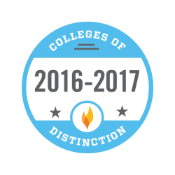Spartans of UD: Rasika Mudalige-Jayawickrama
Oct 25, 2017
Spartans of UD is a new feature that highlights what makes University of Dubuque special – the people who live, work, and study on campus. Rasika Mudalige-Jayawickrama, PhD, is the associate professor of natural and applied sciences. She has been a Spartan for 10 and a half years.

RASIKA MUDALIGE-JAYAWICKRAMA, PhD
Associate Professor of Natural and Applied Sciences
1. What brought you to the Department of Natural and Applied Sciences at UD?
“A tenure track job was one reason. UD’s mission of teaching first generation college students was important to me. I was a first generation college student and I appreciate the guidance given to me by my professors in Sri Lanka. I also prefer a teaching job to a research only job. UD provides good opportunities to involve students in research projects. It gave me a balance in teaching and research compared to other small colleges.”
2. How would you describe your teaching philosophy?
“I am a person who believes in learning through doing science. I incorporate individual research projects into lab classes. Students learn by writing a research proposal, executing it, gathering data, and presenting the data to a wider audience. Science is not listening and memorizing a bunch of facts. It is about experimenting, observing, data gathering, and reaching your own conclusions – in other words, learning for yourself. Knowledge has to be built over the years and it is a lifelong process. My philosophy is to teach students how to lay down a solid foundation so that they can build their own knowledge through the process of doing science.”
3. Your research on orchids is extensive. Can you describe some of your latest research on orchids?
“I am working on two exciting research ideas. One is to find freezing tolerant genes from a native orchid of Iowa. There is an unusual orchid in Iowa that goes through winter with a green, photosynthesizing leaf. When all the other plants shed their leaves in late October, this plant produces a new leaf and keeps it until next spring. I am trying to find out how this unusual plant stays alive all through the winter with a green leaf. The second project is to introduce new flower colors to commercial orchids. I have been isolating flower color genes from orchids throughout my PhD and post-doctoral research. I am trying to shut down the purple color, the most common color among commercial Dendrobium orchids and redirect the color pathway towards red/orange or blue colors.”
4. Why did you decide to research orchids?
“They are one of the most fascinating group of plants I have ever seen. The orchid family has approximately 30,000 known species. They have such a variety of shapes, sneaky ways of fooling the insects to come to the flower and get pollinated, and ability to grow from cool wet climates to arid, desert-like climates. There are so many things we do not know about them. It is my passion to find out some of their secrets before I finish my research career.”
5. You routinely mentor/advise students during research projects. What has been your favorite part of mentoring/advising students through the research process?
“My favorite part is when they compete with other students coming from big research schools and get into graduate programs in prestigious universities. I am so proud of them when they walk across the stage at graduation and move onto the next stage of their life in graduate school, professional school, or jobs. I had 28 research students who have worked with me, of which 25 are either working or in graduate school. They send me emails from time to time with their good news and thank me for guiding them through research. I am proud of them as if they are my own children. I miss them for a while, but I get excited to mentor the next set of students as they come along.”
6. In 2015, you were recognized with the John Knox Coit Prize and appointed into the UD Faculty Hall of Fame. What was it like to receive that honor?
“I was extremely happy, honored, and humbled all at the same time. I try hard and put a lot of extra time into teaching. I am grateful for my husband and son who have given me a lot of support and love. My philosophy has always been to do the task I am entrusted with to the best of my ability and strive hard to reach every student. At the same time, what an awesome responsibility it is! I get the privilege of shaping a young person’s character and future. It is a happy occasion if an impartial judge tells me I am taking that responsibility seriously and doing a good job of it. I came from humble beginnings from a family who supported my ambition for higher education. I was sad my parents were not there to see me get the recognition for my hard work, but I think I exceeded their expectations and they would have been overjoyed for me.”





